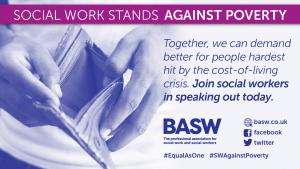Call for Evidence: Anti-Poverty and Social Work practice
Social workers in the UK are increasingly working exclusively with people whose problems are rooted in or exacerbated by worsening poverty and its consequences – poor housing, nutrition, mental and physical health, social exclusion and downward spirals of experiences that blight the potential of adults and children. This includes in-work poverty and unfeasibly low disability benefits.
BASW UK have launched a campaign to put pressure on the UK Government to tackle poverty. As part of this campaign, we will provide members with information and resources, and reach out to the profession to amplify social work’s voice.
We need your experiences from the front line to inform our campaign.
We are looking for case studies or examples of how poverty is impacting front line social work practice. We will use these case studies to illustrate our campaign and create resources for other social workers. We understand and acknowledge the importance of confidentiality, and we will not share any information that identifies you or any person mentioned in your experience from the front line.
How to contribute your experiences to the campaign
Have you had a case where poverty has made a person’s circumstance more difficult or complex? Has poverty made it harder for a person to have a positive outcome? We would like to hear your stories from the front line and work with you to create a case study which can explain how poverty is making social work practice more difficult.
Please email BASW UK’s Public and Political Affairs Lead Kerri.Prince@basw.co.uk with any examples that you’d be happy to share with the campaign.
All case studies received will be held in line with GDPR and will only be used for the purposes of the campaign. No personal information, including the name and contact details of the person submitting the case study, will be shared. Please contact us if you have any concerns about personal or identifiable information.
BASW UK’s anti-poverty campaign
This is part of the campaign launched by BASW UK which calls on the UK Government to:
1. Extend the debt breathing space scheme to 180 days
As poverty worsens, debt increases. The breathing space scheme is a ‘pause’ on action and contact from creditors that also prevents interest, fees, penalties, or charges being added for a 60-day period. There is also a mental health breathing space that can last as long as the crisis treatment lasts plus 30 days. There were 6,342 Breathing Space registrations in October 2022, which is 31% higher than the number registered in October 2021. 6,230 were Standard breathing space registrations, which is 31% higher than in October 2021, and 112 were Mental Health breathing space registrations, which is 38% higher than the number in October 2021.
2. Freeze evictions during the cost-of-living crisis to prevent further homelessness
Reducing income and increasing demands from landlords will translate into more evictions and more families becoming homeless. This cannot be allowed to happen and would cause untold damage to adults and children, placing many at safeguarding risk and lead to even more demand on social care and other services.
3. Scrap the two-child cap on benefits
At present, relevant benefits are only paid for the first two children. This impacts on many families but disproportionally impacts on those ethnic groups who have larger families. It also results in inhumane means testing, for example, the rape clause.
To find out more about BASW UK’s anti-poverty work, visit the ‘Social Work Stands Against Poverty’ hub on our website.
For more information email BASW UK’s Public and Political Affairs Lead Kerri.Prince@basw.co.uk

Call for Evidence: Making a submission
We recognise and understand that social workers may be concerned about sharing examples of cases that they have been involved in.
We do not want you to break confidentiality, but instead ask you to share with us your experiences in a way that protects the people you have worked with, your professional ethics, but also allows us to illustrate our campaign with real examples.
When sharing examples of your practice with us, ensure that you:
- Remove or change names and locations
- Reflect on your submission and make sure that it cannot identify anyone
We also recommend that you contact us using a personal email address and not the email address provided to you by an employer.
You may want to create a synthetic case study based on real life cases that you’ve been involved. You can do this by merging several cases in one so that while it is not one case, it is several rolled in one which reduces the chances of any single incidence being identified.
BASW UK will not share your name or any details about you.
If you would like to submit a case study or example but are not sure how to do this, you can contact BASW UK’s Public and Political Affairs Lead Kerri.Prince@basw.co.uk who is happy to support.
Below is an example of a case study:
Mary* has been in a relationship for 3 years and is living with her partner and their three children. Mary is on Universal Credit. Mary was also overpaid benefits and now pays back the DWP from her Universal Credit which means that she has less money than she is entitled to. Recently, Mary’s partner has become physically and mentally abusive. Her partner won’t let Mary get a job as it would involve a life outside of the home. Mary says that she cannot afford to leave her partner as she doesn’t have enough money to live on. She isn’t entitled to any benefits for her third child, which makes it even harder to afford even the basics. A low income, and a fear that she would live in poverty if she left her abuser, is keeping Mary in an abusive relationship and her children in a violent home.
[Mary is not her real name].